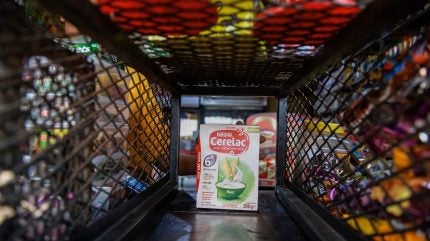
Nestlé is facing renewed criticism of “double standards” for the levels of sugar in baby-food products sold in emerging markets.
Public Eye, a Zurich-based NGO that has been working alongside various civil society organisations in Africa, has published new research after studying Cerelac infant cereal sold in the region.

Discover B2B Marketing That Performs
Combine business intelligence and editorial excellence to reach engaged professionals across 36 leading media platforms.
According to the NGO, its research showed added sugar in more than 90% of the tested samples of on average almost six grams per serving, equivalent to one-and-a-half sugar cubes.
Public Eye said the amount is 50% higher than the average showed in a study it ran last year.
Reacting to the latest accusations, Nestlé said it “disagreed” with the report, which the Swiss giant said “contains misleading and unfounded allegations”.
The NGO collected nearly 100 Cerelac products sold in 20 African countries and had them tested by Inovalys, a French lab focused on the agri-food sector.

US Tariffs are shifting - will you react or anticipate?
Don’t let policy changes catch you off guard. Stay proactive with real-time data and expert analysis.
By GlobalDataPublic Eye said the amount of added sugar found in the samples of products in Africa was double the amount detected in India, a major market for the Cerelac brand.
The highest level recorded in Africa was 7.5 grams per serving – nearly two sugar cubes – in a Cerelac product sold in Kenya for babies as young as six months.
Products containing at least seven grams of added sugar per serving were found in seven African countries.
Except for two new products in South Africa, all sugar-free Cerelac products found in Africa were imported from Europe by “other actors” and not originally intended for the African market, the NGO said.
Conversely, in Switzerland, Nestlé’s home market, its flagship baby cereal brand contains zero added sugar, Public Eye added. Cerelac products sold in Germany and the UK for babies from six months onwards also contain no added sugar. Public Eye called the differences an “unacceptable double standard”.
African civil society organisations including the International Baby Food Action Network (IBFAN) and Nigeria’s Consumer Advocacy and Empowerment Foundation (CADEF) have written to Nestlé CEO Philipp Navratil demanding the global removal of added sugar from all baby foods, in line with World Health Organization (WHO) guidelines.
“If added sugar is not suitable for Swiss and European children, it is not suitable for children in Africa and beyond,” the letter read.
The organisations accused Nestlé of “deliberately putting the health of African babies at risk for profit”, saying that the firm is “well aware” of the health risks linked to sugared baby food.
The Public Eye report also revealed the “lack of transparency” in packaging.
It highlighted that for roughly two-thirds of the analysed products, the amount of added sugar was not disclosed on the packaging.
Reacting to the accusations, Nestlé said in a statement to Just Food: “We disagree with this report as it contains misleading and unfounded allegations. We do not have double standards, our approach to nutrition is consistent across all countries.”
The company emphasised that sugar levels in its infant cereals are “well below” the standards set by Codex Alimentarius, with the products’ composition and declarations on packaging “fully aligned” with local regulatory requirements.
Nestlé called it “misleading and scientifically inaccurate to refer to the sugars coming from the cereals and naturally present in fruits as refined sugars added to the products”.
“If we exclude sugars coming from ingredients like milk, cereals and fruit, our Cerelac infant cereals do not contain the levels of added refined sugars mentioned in the report.”
The company also said it is “accelerating” the launch of no-added-sugar variants, including in Africa. Nestlé said the products are available in “97%” of markets and is aiming to reach 100% by the end of the year.
“We offer variants with and without added sugars positioned in the same price range in both Africa and Europe,” it added.





